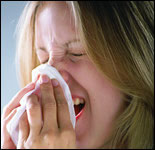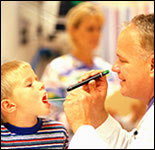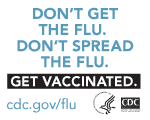Get Smart: Know When Antibiotics Work
 October 6–10 is Get Smart About Antibiotics Week. This is the time to learn about the potential danger of antibiotic resistance – and what you can do to prevent it. Remember, the power to prevent antibiotic resistance is in your hands!
October 6–10 is Get Smart About Antibiotics Week. This is the time to learn about the potential danger of antibiotic resistance – and what you can do to prevent it. Remember, the power to prevent antibiotic resistance is in your hands!

Dangers of Antibiotic Resistance
Antibiotic resistance is one of the world's most pressing public health problems. This condition occurs when bacteria change in some way that reduces or eliminates the effectiveness of drugs, chemicals, or other agents designed to cure or prevent infections. Widespread overuse of antibiotics is fueling an increase in antibiotic-resistant bacteria. So the next time you really need an antibiotic for a bacterial infection, it may not work.
If You Have a Cold or Flu, Antibiotics Won't Work for You!
Colds and flu are caused by viruses, not bacteria. Taking antibiotics when you have a virus may do more harm than good. Get smart about when antibiotics are appropriate. Taking them for viral infections, such as a cold, cough, the flu, or acute bronchitis:
- Will not cure the infection;
- Will not keep other people from getting sick;
- Will not help you feel better; and
- May cause unnecessary and harmful side effects.
What Not To Do

- Do not demand antibiotics when a healthcare provider says they are not needed. They will not help treat your infection.
- Do not take an antibiotic for a viral infection like a cold, a cough, or the flu.
- Do not take antibiotics prescribed for someone else. The antibiotic may not be appropriate for your illness. Taking the wrong medicine may delay correct treatment and allow bacteria to multiply.
- If your healthcare provider prescribes an antibiotic for you:
- Do not skip doses.
- Do not save any of the antibiotics for the next time you get sick.
What To Do

Talk with your healthcare provider about the best treatment for your illness. To feel better when you have an upper respiratory infection and antibiotics are not needed:
- Increase fluid intake;
- Get plenty of rest;
- Use a cool-mist vaporizer or saline nasal spray to relieve congestion; and
- Soothe your throat with ice chips, sore throat spray, or lozenges (do not give lozenges to young children).
Also, make sure you properly dispose of leftover and expired antibiotics. Clean your hands often, especially before meals and after touching pets. And make sure both you and your child are up-to-date on your recommended immunizations.
More Information
- Send an eCard to
- Download a podcast
- Antibiotics: One of the Greatest Discoveries of the 20th Century (
 1:38 minutes)
1:38 minutes) - Get Smart: Know When Antibiotics Work (
 5:58 minutes)
5:58 minutes)
- Antibiotics: One of the Greatest Discoveries of the 20th Century (
- Get Smart: Know When Antibiotics Work
- Antibiotics Information en Español
- Get Smart for Healthcare Providers
- Antibiotic Resistance
- Medication Safety
- Influenza
Medical Disclaimer
CDC's Web site provides health information for your general knowledge. Concerns about a medical condition–either your own or that of a family member–should always be addressed to your primary care physician for advice and care appropriate to your specific medical needs. CDC does not recommend self-diagnosis or self-management of health problems that should be attended to by healthcare professionals.


